STC
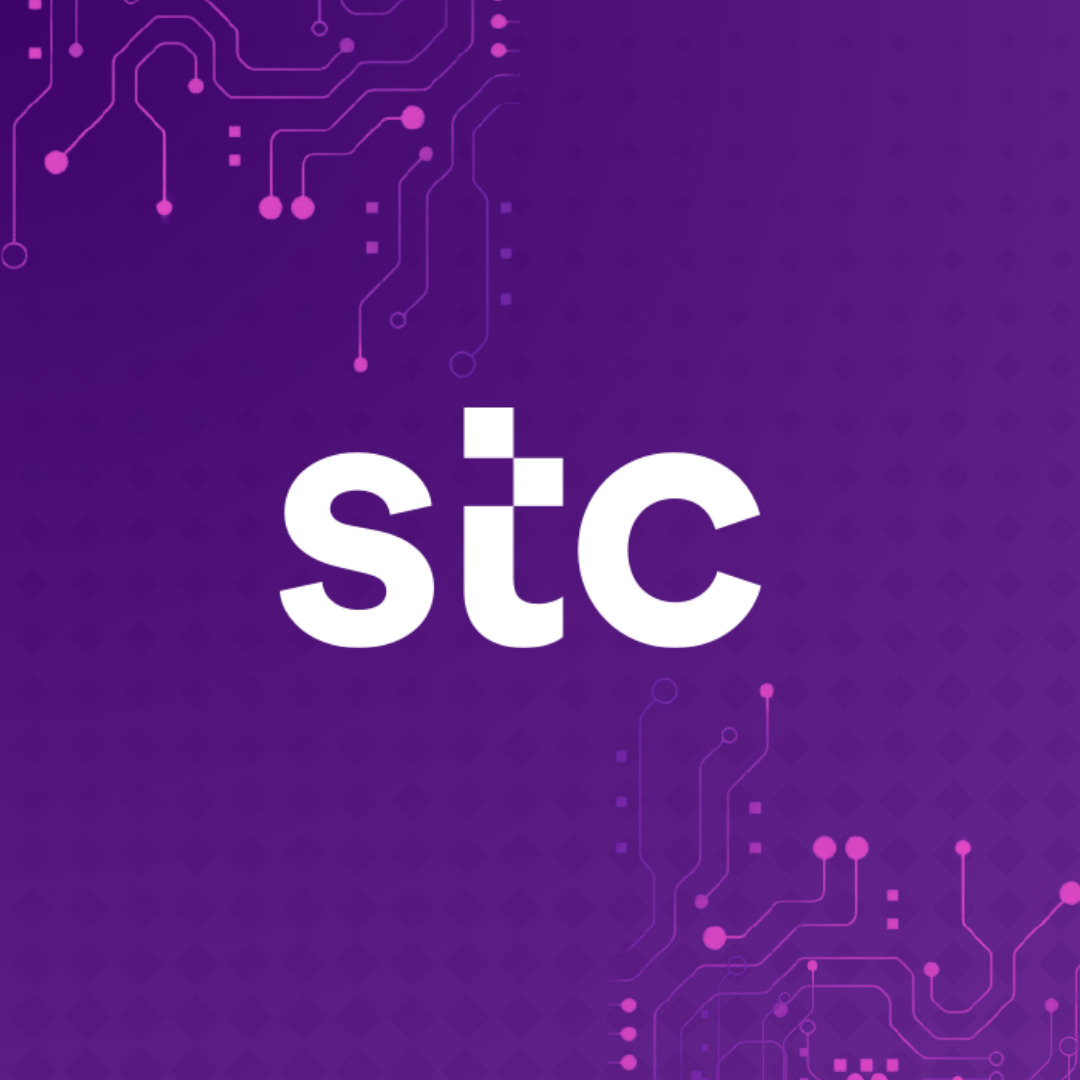
When discussing the major successful Saudi companies one that comes to mind is Saudi Telecommunication Company (STC). It was established as a Saudi Joint Stock Company under Royal Decree No. M/35. Saudi Telecommunication Company is one of the Middle East's operators and the Saudi digital enabler of telecommunications services. Some of the important services provided by STC are data, cloud computing, mobile, broadband, landline and fixed infrastructure services.
The company was first founded on April 21, 1998, and its current CEO is Olayan M. Alwetaid he has an experience of more than 20 years in the industry and worked at Saudi Aramco before joining STC.
Over the years we have seen the company grow drastically، where it launched different successful projects. STC Pay, a digital banking service, is a perfect example of the company's growth and development. On the 23rd of June 2021, STC pay was approved by the Council of Ministers in Saudi Arabia to transform the platform into a digital bank that offers a variety of financial services online.
The expansion and business development of the company is our major reason behind analyzing STC where we can determine the company's value through their financial performance. Another reason behind analyzing the company is to understand its long-term potential, growth and where it is heading by going through the company's industry and pointing out the attractiveness and dynamics of its market and identifying STC market share. In this report, we will be considering the company’s products and main projects.
and we will use financial ratios which are known instruments to evaluate how well a company's current financial position is compared to its previous performance or by comparing it to it peers in the same industry. The main ratios we will be identifying in this report are (Net profit margin, Return on Equity (ROE), Debt-equity, and Current ratio)
The global telecommunications industry :
The telecommunications sector covers companies and regulatory authorities that provide the infrastructure and services required to transmit signals, messages, and data. Telecom networks are vital for consumers and organizations worldwide. The reliability of telecom services has become increasingly important for organizations and governments as well. The global telecom services market size was valued at USD 1,885.41 billion in 2023 and is expected to expand at a compound annual growth rate of 6.2% from 2023 to 2030 to reach USD 2,874.76 billion. One of the key factors driving the industry is the rise in spending on the deployment of 5G infrastructure due to the demand for next-generation technology and smartphones, the high demand for high-speed data connectivity, and other factors fueling the market growth. Telecom industry leaders worldwide can change from year to year based on their market capitalization. As of May 2023, the top five telecom companies ranked by market cap are China Mobile, Comcast, T-Mobile US Inc., Verizon, and AT&T. China Mobile has the highest market cap in the global telecom industry, equal to USD 188.42 billion, and it is a government-owned enterprise. On February 6th, 2023, CMI (China Mobile International) signed a memorandum of understanding in Riyadh, Saudi Arabia, with a Saudi company to establish a partnership that will contribute to the development of the Saudi ICT sector.
The Saudi Arabian Telecommunications Industry:
The Saudi Arabian telecommunication sector has been seeing strong growth on the back of high penetration and a bloom in data service demand, and yet there is a strong growth due to the support of high demand and the expansion of open-access models and 5G services that are forecasted to grow at 10% in the upcoming years that will drive the revenue for the telecom operators in the local market, which means that it is a promising sector. but the barriers are high, given what the sector requires in terms of equipped infrastructure. The Saudi market is the largest in the Middle East region; it represents more than 55% of the Middle East market and three companies have dominated the sector for a long time, which has earned them the trust of customers namely STC, Mobily, and Zain.
Development of the telecommunications sector :
Saudi Arabia ranks third among the G-20 countries as the fastest growing and ranks first in the world in terms of average download speeds in “5G.” The largest industrial market in the Middle East and North Africa., which opens the appetite for new foreign investment to enter the market.
The Communications and Information Technology Sector Strategy 2019-2023 falls within the framework of the Ministry of Communications and Information Technology’s efforts to build a strong and advanced digital infrastructure to accelerate the process of digital transformation, and thus support the Kingdom’s Vision 2030, which aims to enhance communications and information technology. The role of the sector in building a digital society, digital government, a prosperous digital economy and an innovative future for the Kingdom.
Dr Muhammad bin Saud Al-Tamimi, Chairman of the Communications and Information Technology Committee, confirmed that the communications industry in the Kingdom of Saudi Arabia, with unlimited support from the wise government, is going through a stage of great development and growth in various fields. areas, the communications industry in the Kingdom enjoys the supervision and attention of Crown Prince Mohammed bin Salman and the follow-up of His Royal Highness Prince bin Abdulaziz.
Future Insight of The Telecommunications Industry:
Saudi Arabia's telecom industry is anticipated to grow significantly during the next several years. As the Kingdom makes significant investments in its digital infrastructure, the demand for telecom services is expected to increase.
Since Saudi Arabia's population is anticipated to reach 35 million by 2030, government investments and population growth are both anticipated to support the sector's expansion. This expansion will produce a sizable consumer base. To keep up with the rising demand for services, telecom providers will need to make investments in new infrastructure and technology. Companies will also need to create fresh goods and services to capitalize on the expanding digital economy.
The following are some of the specific trends that are expected to shape the future of the telecommunications industry in Saudi Arabia:
The rise of 5G technology: It is the new generation of wireless technology and is expected to revolutionize the way we communicate and use the Internet. The Kingdom is Saudi Arabia is one of the first countries in the world to launch this commercial network, and Saudi Arabia ranked third as the fastest-growing country in the economy among the countries of the Group of Twenty, and the Kingdom ranked first in the world in average download speed in the fifth generation, the expectations of some economists raised the ceiling of the market growth Saudi Telecom, which is the largest market for the sector in the Middle East and North Africa, which opens the appetite for new foreign investment to enter the market.
Growth of the Internet of Things: The Internet of Things is a network of physical devices connected to the Internet. As these devices can collect and share data, this is expected to have a significant impact on a wide range of industries, including telecommunications, and according to a report from a market research firm, the IoT market in Saudi Arabia was estimated at $201 million in 2018. 2021, and is expected to grow by about $ 539 million by 2027, and this is due to the increased demand for contactless payment technologies, and the increased use of Bluetooth and Wi-Fi networks.
The growth of cloud computing: Cloud computing is a way to store and access data and applications via the Internet, and within the framework of the Kingdom’s efforts to develop the sector, the Saudi Cloud Computing Company was announced, as it was entrusted with the task of operating the infrastructure under full Saudi supervision in cooperation with the Saudi Telecom Company and four other major parties.
Keeping up with the promising new sector is what sets STC apart, so it invests in a variety of activities that are hard to categorize, whether they are supporting investments in its subsidiaries or investments on which the company is based. All of the primary STC activities are collectively referred to as the "group," and they vary in how they are carried out. The distinction between the activity and those who provide information, flags, and digital payments as well as telecommunications services. We are not only confined to reviewing the company's most salient activity here for a while:
- Building, administering, running, and maintaining fixed and mobile networks and infrastructure
- Delivery of diverse information technology and telecommunications services, their provision to customers, and their maintenance and management.
- Making use of the most recent gadgets to develop and expand networks, information technology, and infrastructure technology.
- Providing all-inclusive communications, information technology, and cloud services, including Internet of Things, critical services, and communications.
- Providing corporate insight, data investment, and decision support solutions
- Providing services for supply chains
- Online banks
- Services for cyber security
And many other services provided by STC Group, and we will now show you a quick overview of some of its local subsidiaries:
The Arab Company for Internet and Communications Service (Solutions)
The Arabian Company for Internet Services and Communications Solutions was established in April 2002 and provides Internet services, operating communications projects, and transferring and processing information in the Saudi market. It is headquartered in the Kingdom and carries out its operational activities in the Kingdom.
The Telecommunications Towers Company (Twal)
In January 2018, STC established the Telecommunications Towers Company -Twal- a closed joint stock company, with a capital of 2500 million Saudi riyals, wholly owned by STC, and its headquarters is located in the Kingdom, and it operates in the kingdom. Tuwal is responsible for owning, constructing, operating, leasing and commercially investing the towers in the Kingdom
Saudi Telecom Channels Company (Qanawat)
The Saudi Telecom Channels Company - Qanawat - was established in January 2008 to engage in wholesale and retail trade in recharge card services, hardware and communication equipment, computer services, sale and resale of all fixed and mobile communications services, maintenance and operation of commercial complexes. Qanawat operates in the Saudi market and its head office is located in the Kingdom, and it carries out its operational activities in the Kingdom, Bahrain, Oman and Kuwait through subsidiaries in Bahrain, Oman and Kuwait operating in the same activity.
STC Bank
In November 2017, the Saudi Digital Payments Company, STC Bank, was established as a closed joint stock company, and its main activity is to provide digital payment services. In 2020, the Saudi Central Bank licensed the Saudi Digital Payments Company - STC Bank as an electronic wallet company
Advanced Company for Technology and Cyber Security (Sarrar)
Sarrar is the technical provider of information technology, communications and digital services in the Kingdom. As a business security and privacy expert, Sarar offers a comprehensive suite of solutions that help customers operate online safely and efficiently. The tools we provide help customers detect and prevent cyber security attacks, protect their digital future, and provide protection and security.
The Internet of Things Information Technology Company
The Internet of Things Information Technology Company - a limited liability company - was established in May 2022 in partnership between the Public Investment Fund and STC, with an equal share for both parties and a capital of 492 million Saudi riyals. Information Technology aims to be the regional center for the Internet of Things in the Middle East and North Africa region, by accelerating the adoption of these technologies. Noting that Internet of Things technology is one of the areas of investment within the Dare strategy developed by STC following the Kingdom's digital transformation initiatives.
And here is a chart summarizing the market share of the telecommunication and technology sector for the year 2022:
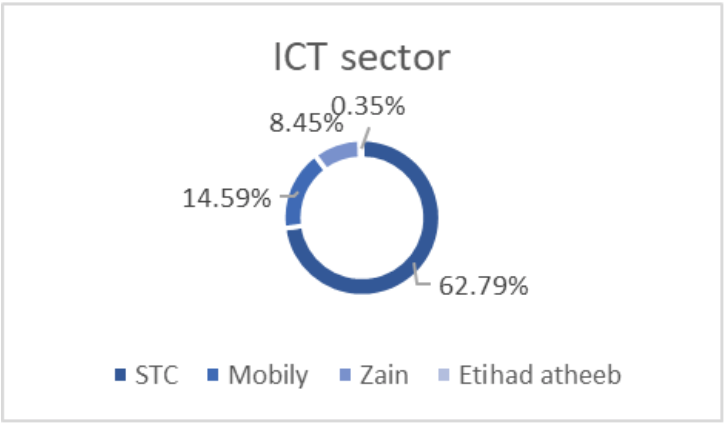
As can be seen in the figure, STC was able to take the largest market share, which indicates the strength of its competitive position in the sector and the success of the company's strategies to reach a larger number of customers through the various types of services it provides.
And here are some of the most important events for STC:

After we talked about the company and its most important activities and subsidiaries, we will now move to a quick overview of its competitors and their activities.
Zain
is the leading mobile telecommunications service provider in the Middle East and North Africa region Zain was established in 1983 in Kuwait, under the name of the Mobile Telecommunications Company (MTC), as the first operator of mobile communications services in the region, and since they launched their expansion strategy in 2003, rapid expansion was achieved across the Middle East and Africa region through the acquisition of several Mobile telecom companies. In 2007, the Mobile Telecommunications Company (MTC) switched to the Zain brand, intending to highlight its growing position as a leading multinational mobile telecommunications service provider with global aspirations, and thus the Zain brand was adopted by all group companies. In 2008, it became the fourth largest operator of mobile telecommunications services in the world in terms of geographical reach, thanks to the spread of our operations in 15 African countries and 7 countries in the Middle East. Zain considers itself a major partner for the communities in which it provides its services. Other than that, it is committed to providing world-class mobile communications services, it is committed to its duties in the areas of social responsibility. It also seeks to contribute to its economic, social and cultural projects in making a positive impact on people's lives. The company's strategy and vision are to build a sustainable and innovative digital communications company that serves communities and the business sector. The company focused on six transformative initiatives: customer experience, operational effectiveness, value management, B2B solutions, digital platform and innovation, and talent development., to serve individual and institutional customers through an enriching lifestyle experience and its activities
Zain offers many activities and services, including:
- Trade and retail
- Unified Communications Platform service
- Cloud packages
- Call packages
- Communication packages
- Marketing packages
As for its market share, it represents 8.45% of the total companies in the telecommunications sector
Mobily
Etihad Etisalat Company (Mobily) is a Saudi company established in 2004. Mobily's growth phase witnessed many achievements, which were reflected in several major strategic acquisitions made by the company. In 2008, it acquired Bayanat Al-Oula, a company licensed for data services. Later that year, it bought an absolute majority stake in Zajel, the leading Saudi internet service provider. Mobily also owns a 66% stake in the Saudi National Fiber Optic Network project, which is one of the largest projects in the world. Through this network, Mobily provides its customers with an integrated communications infrastructure that includes mobile communication services and fast internet.
For the company's activities:
Mobily also provides comprehensive services to three main areas: individuals, companies and carriers. In addition to having the largest FTTH network and one of the largest data center systems in the world, it also has one of the largest wireless networks in the Kingdom and throughout the region.
Its market share is represented by 14.59% of the total companies in the telecommunications sector.
Etihad altheeb
Etihad Atheeb Saudi Telecom Company, also known as "Go", is a shareholding company in the telecommunications industry based in the Kingdom of Saudi Arabia. The Company is primarily engaged in providing a range of fixed and wireless services to individuals, homes and businesses through global wireless broadband interoperability, such as voice services, data services, broadband Internet services, Internet telephony services, international gateways and fixed-line (WiMax) technology. as a communications technology. The company's voice services include voice-over internet protocol, number portability, unified communications and video calls. In addition, the company offers services and applications such as dedicated and shared networking and hosting, public and private Wi-Fi services, application services, IP-based optical services, and managed services. The company provides various fixed line and wireless services such as voice telephony, data services, broadband internet services, voice-over-internet services and international call stations; This is whether through WiMAX technology, fixed telephone lines, and via fiber optic cables to all customers, whether they are individuals, homes, or companies
Its market share compared to the rest of the sector is 0.35%.
Finally, we will show you a comparison between the company and its competitors using financial ratios
Net profit margin
It is the ratio that measures a company's profitability by comparing its net income with its revenue, where the higher net profit margin indicates that the company can generate greater profits for any level of revenue it has.

Looking at STC, Zain, Atheeb and Mobily, we see that STC has outperformed its competitors in terms of net profit margin over the past four years, with an average growth rate of 3% per annum. We see that the reasons that led to the acceleration of the volume of revenues and profits of STC are many, due to the significant expansion of activities witnessed by STC. Perhaps one of the most prominent reasons is that the partnerships concluded by the group had an impact on the financial results, including the agreements with the "Shareek" program and the Ministry of Investment in the submarine cable project, in addition to entering the European market through the signing of the "Tawal" company (owned by STC) an agreement to acquire the assets of the telecommunications towers of one of the prestigious foreign companies.
The debt-to-equity ratio
(D/E ratio) is a financial ratio that measures a company's leverage, it is calculated by dividing the total liabilities by its shareholder equity. The ratio evaluates how much debt or equity financing is used in a company's capital structure.
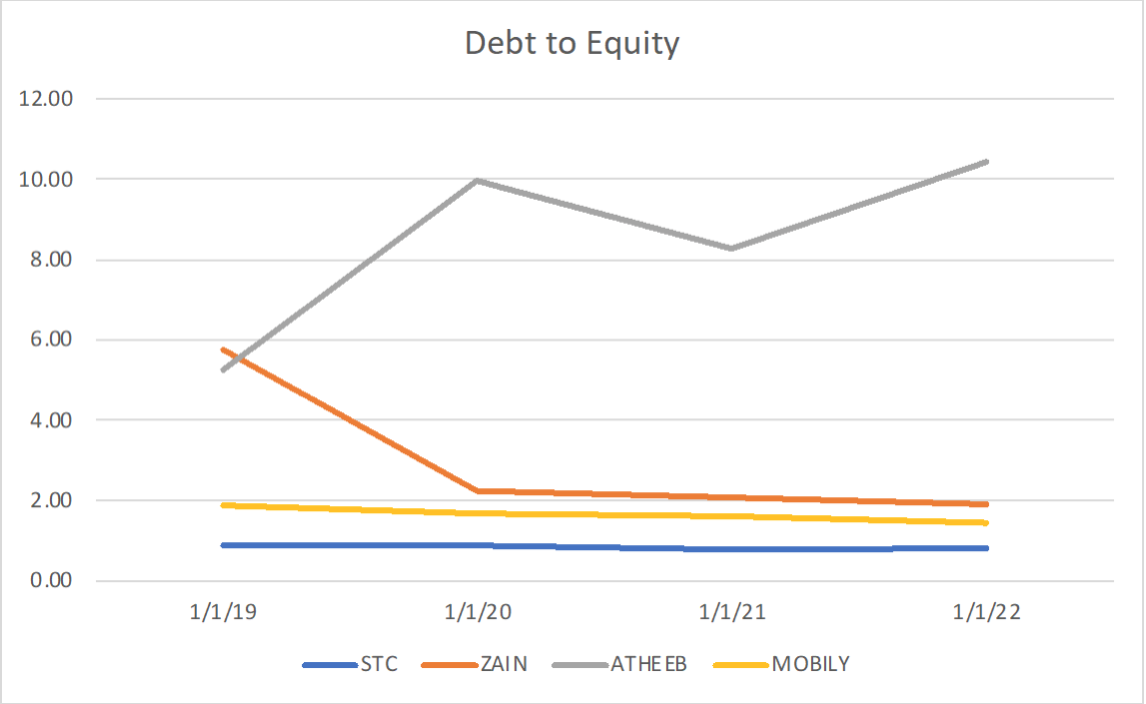
Over the past 4 years STC had the lowest D/E ratio of 0.84 compared to its peers, the highest D/E ratio was 8.48 by ATHEEB. Having a low D/E ratio indicates that the company is using more equity than debt for financing its operations. We can also conclude that STCs riskiness of its capital structure is low compared to its competitors in the industry.
Current ratio
measures the business's ability to pay its debt obligations. the current ratio and also called the working capital ratio, measures a company's capacity to repay its short-term obligations with a one-year maturity, the ratio is calculated by dividing current assets by current liabilities.
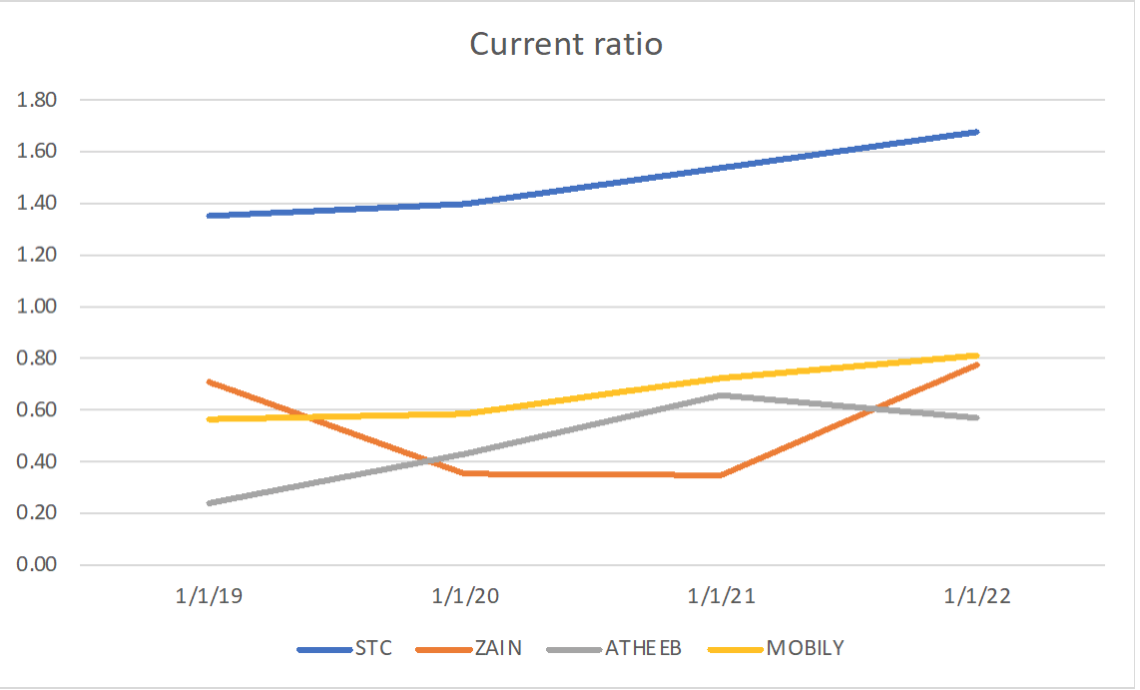
From 2019 to 2023 STC had the highest current ratio and its Current ratios have been growing (1.35, 1.39, 1.53, 1.67) In the past 2 years, the growth was constant by 14% which indicates that the company is meeting its obligations and being able to repay its debt. A low current ratio indicates that a company may have difficulty meeting its short-term obligations, which can increase the risk of default.
In the past year Zain had a current ratio of 0.77 and Mobily had a current ratio of 0.81 both companies had an increase from 2021s ratio as well as STC this indicates that the telecommunication industry is growing and developing. On the other hand, Atheebs 4 years avergae current ratio was 0.47 which is the lowest compared to the companies in the industry and this might be risky for investors because it might not meet its short-term obligations.
Return On Equity
The return to equity ratio is calculated by dividing the annual return (net income) by the value of its total shareholders’ equity. ROE is expressed in percentage. When a corporation is using its shareholder equity effectively and making a return it is said to have a high ROE.
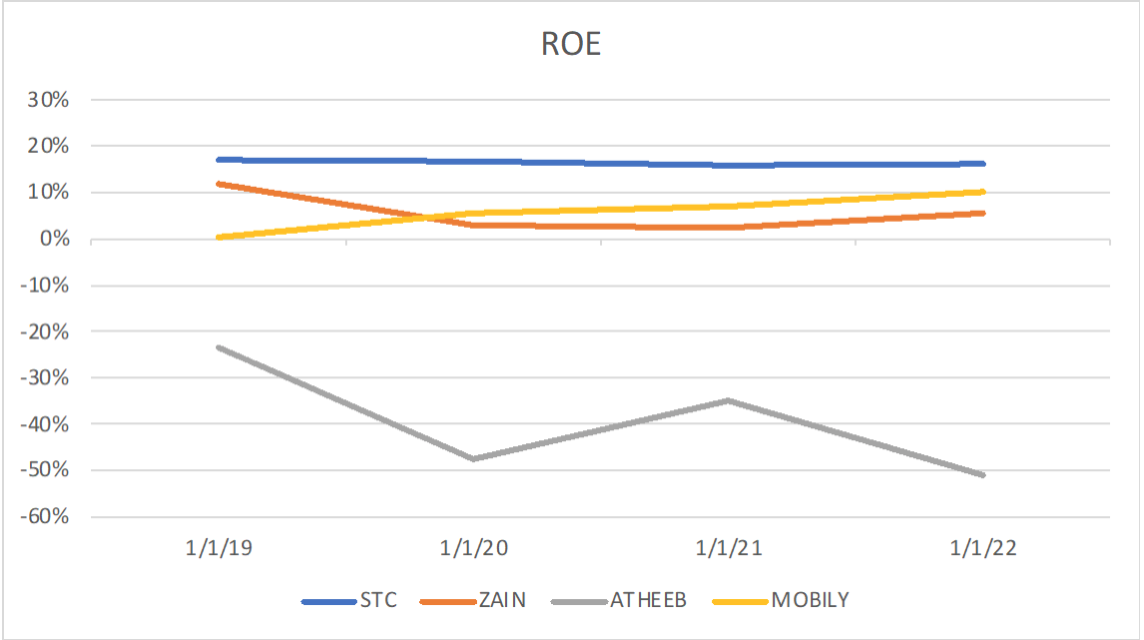
Over the past 4 years, STCs ROE is stable at 16%, reflecting that the company's management team are managing the cash flows effectively. As of 2021, the company’s ROE is 15.85% and this is due to the COVID-19 pandemic which required the company to a substantial amount of capital, which resulted in a decrease in the ROE
It is noticeable that this return for the company, Atheeb, started from 2019 at -23.5 % and continued to be removed until the year 2022 at a rate of almost twice -51.01 %, and this is, of course, a return on the sake of the net profit, and the company attributed the reason for this is the assumption of revenues and other revenues and increasing the expenses of consumption and fees Finance.
As for Zain Company, Al -Amaid was high in the year 2019 by 12% nearby percentage, which is the highest return it obtained during this year and the following, but it was also damaged by any sector in the period of 2020. The good news is that the company becomes clear that it started to rise in this return in the year 2022 at a rate close to 6%.
It seems here that we have a Mobily company, which is the single company that was not affected by the Corona period and the royal rights return continued to grow from 0.23% to 10.13% in the year 2020, not to mention that the company increased its net profit during this period and the growth pace is still continuing until 2022.
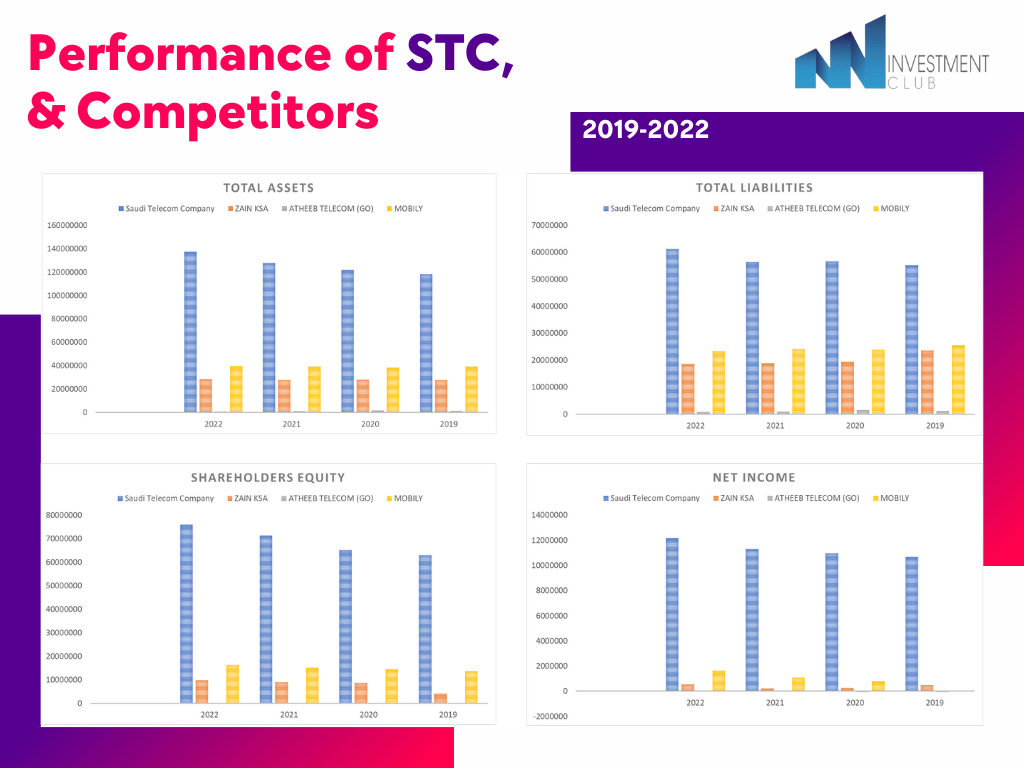
To see the full analysis just click here
Resource:
- https://www.zain.com/ar/about-us/overview
- https://www.alarabiya.net/aswaq/companies
- https://www.saudiexchange.sa/wps/portal/saudiexchange/ourmarkets/main-market-watch?locale=ar
- https://www.argaam.com/en
- https://www.mobily.com.sa/wps/portal/web/personal
- https://sa.investing.com/equities/atheeb-telecom-company-profile
Prepared by:
Sarah Alotaibi
Aljuharah Alnafissah
Shahad Alwahbi
Lujain Alabrqan
Noura AlFulig
Afnan Alharbi
Sarah Bin Masad